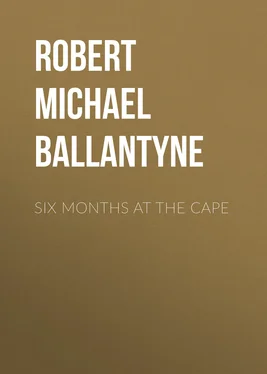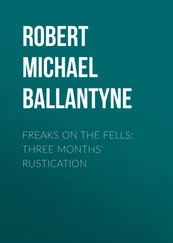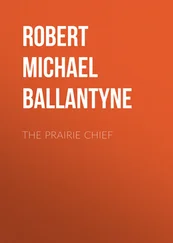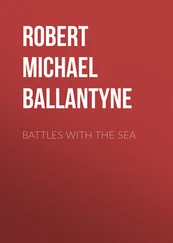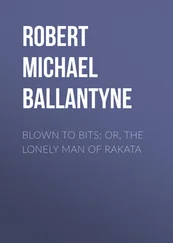Robert Michael Ballantyne - Six Months at the Cape
Здесь есть возможность читать онлайн «Robert Michael Ballantyne - Six Months at the Cape» — ознакомительный отрывок электронной книги совершенно бесплатно, а после прочтения отрывка купить полную версию. В некоторых случаях можно слушать аудио, скачать через торрент в формате fb2 и присутствует краткое содержание. Жанр: Путешествия и география, История, foreign_edu, foreign_antique, foreign_prose, на английском языке. Описание произведения, (предисловие) а так же отзывы посетителей доступны на портале библиотеки ЛибКат.
- Название:Six Months at the Cape
- Автор:
- Жанр:
- Год:неизвестен
- ISBN:нет данных
- Рейтинг книги:3 / 5. Голосов: 1
-
Избранное:Добавить в избранное
- Отзывы:
-
Ваша оценка:
- 60
- 1
- 2
- 3
- 4
- 5
Six Months at the Cape: краткое содержание, описание и аннотация
Предлагаем к чтению аннотацию, описание, краткое содержание или предисловие (зависит от того, что написал сам автор книги «Six Months at the Cape»). Если вы не нашли необходимую информацию о книге — напишите в комментариях, мы постараемся отыскать её.
Six Months at the Cape — читать онлайн ознакомительный отрывок
Ниже представлен текст книги, разбитый по страницам. Система сохранения места последней прочитанной страницы, позволяет с удобством читать онлайн бесплатно книгу «Six Months at the Cape», без необходимости каждый раз заново искать на чём Вы остановились. Поставьте закладку, и сможете в любой момент перейти на страницу, на которой закончили чтение.
Интервал:
Закладка:
Mr Green joined us. Thereafter we came to the residence of a Mr Priest, who also joined us with his son, and thus we sped on over the flat sandy plains, inhaling the sweet scent of mimosa blossom, glowing in the fervid sunshine, and picking up comrades here and there, until about noon we reached the scene of our intended operations.
This was a vast, almost level plain named the Plaat River Flats. It lay between two rivers, was eight or ten miles wide and upwards of twenty miles in length—a mighty ocean, as it were, of short, compact Karroo, with a boundless horizon like the sea in all directions save one, where a great South African mountain range intercepted the view. Here and there a few clumps of mimosa bushes rose like islets, and lent additional interest to the scene.
We “outspanned”, that is, we unyoked, and “off-saddled” here for luncheon, and found shelter from the sun under a mimosa, which was large enough to merit being styled a tree. Its thorns were from four to six inches in length.
The party had now swelled to fourteen—all stout hardy descendants of the English, Scotch, or Dutch settlers, who had originally peopled the land; good rifle shots, and splendid horsemen. One of them was conspicuous by his brawny arms, which were burnt to a deep brown in consequence of his preferring to hunt and work at all times with shirt sleeves rolled up above the elbows. Another struck me as having the broadest pair of shoulders I ever saw in a man of his size.
“Capital water here,” said Green to me, on alighting beside the mimosa-thorn.
“Indeed,” said I, thirsting for some, “where is it?”
“Here! come; I’ll show you.”
He led me to a spot among the bushes where lay a small pond of thin mud the colour of weak tea with milk.
“There you are,” said Green.
I looked at him inquiringly.
He looked at me and smiled.
I laughed.
Green grinned, and assured me that it was “first-rate water.”
He dipped a cup, as he spoke, and drank it. So did his comrades, with evident satisfaction, though the liquid was so opaque that I could not see the bottom of a tea-cup when it was full.
There could be no further doubt on the point. These reckless and jovial South Africans—European by extraction though they were, and without a drop of black blood in their veins—had actually accommodated themselves to circumstances so far as to consider liquid mud good water! More than that, I found that most of the party deemed it a sufficient beverage, for they were all temperance men, if not total abstainers. Still further, I followed their example, drank of that yellow pond, and actually enjoyed it. Subsequently I made the discovery that there were small animals in it; after that I preferred it in the form of tea, which was quickly infused by our active Hottentots.
The discovery above referred to was made when Green, (or Brownarms, or Broadshoulders, I forget which), was quaffing a cup of the cold element. Having drained it he spat out the last mouthful, and along with it a lively creature like a small shrimp, with something like a screw-propeller under its tail!
Enjoying our tea under the shade of the mimosa, we rested for an hour, and then, saddling our steeds and slinging on rifles and cartridge-pouches, we mounted, and sallied forth upon the plain.
A glorious sensation of freedom came over me as I felt my horse’s springy step,—a sensation which brought powerfully back the memory of those days when I first galloped over the American prairies. Surely there must be a sympathy, a mesmeric influence, between a horse and his rider which sends a thrill through each. Hobson had lent me his own favourite horse, Rob Roy. He was a charming creature; well made, active, willing, and tender in the mouth, but, best of all, he “trippled” splendidly.
Trippling is a favourite gait in South Africa, especially among the Dutch farmers. It is something between pacing and ambling, a motion so easy that one scarce rises at all from the saddle. We trippled off into the vast plain towards the horizon, each horseman diverging a little from his comrades, like a fleet of fishing-boats putting out to sea. Most of the party rode without coats, for the sky was cloudless, and we looked for a broiling day. Brownarms, I observed, had his sleeves rolled up, as usual, to the shoulder. Six-foot Johnny rode a cream-coloured pony, which, like himself, enjoyed itself intensely, and seemed ready for anything. Each man grasped his rifle by the middle with the right hand, and rested the stock on his thigh.
Being a stranger to the work, I had been supplied with a Hottentot as well as a horse,—to guide me and carry my rifle; but I scorned to ride without my weapon, and did not at first see the necessity of a guide in the circumstances. Ultimately I was only too glad to avail myself of his services!
The South Africans call Hottentots “boys,” whatever their age or size may be. My “boy” was named Michael. He was a small wiry man of twenty or thirty,—more or less,—with a dirty brown face, dirty brown garments, and a dirty brown horse. Though a bad one to look at, it was a marvellous horse to go. Michael had a cavernous red mouth, and magnificent white teeth. Likewise he was gifted with a strong sense of the ludicrous, as I have reason to know.
We advanced slowly into the plain at first, and gradually scattered until some of the party began to look like mere specks in the distance. Presently I saw two or three of them break into a gallop, and observed a few moving spots of white on the horizon. I looked anxiously at my boy. He returned the gaze with glittering eyes and said “bok.”
“Boks! are they?” said I, applying my spur and making a leap over an ant-bear hole.
Rob Roy stretched his legs with a will, but a howl from Michael caused me to look round. He was trending off in another direction, and pointing violently towards something. He spoke nothing but Dutch. My acquaintance with that tongue was limited to the single word “Ja.”
He was aware of this, and his visage became all eyes and mouth in his frantic effort to assure me it would be wise were I to follow his lead.
I turned at once and galloped alongside of him in faith.
It soon became clear what he aimed at. The horsemen on the far off horizon were driving the springboks towards the stream which bounded one side of the great plain, Mike was making for the bushes that bordered that stream in the hope of reaching them before the boks should observe us.
Oh! it was a glorious burst, that first race over the wild Karroo, on a spirited steed, in the freshness of early morning—
With the silent bushboy alone by my side,
for he was silent, though tremendously excited. His brown rags fluttered in the self-made breeze, and his brown pony scrambled over the ground quite as fast as Rob Roy. We reached a clump of underwood in time, and pulled up, panting, beside a bush which was high enough to conceal the horses.
Anxiously we watched here, and carefully did I look to my rifle,—a double-barrelled breech-loading “Soaper-Henry,”—to see that it was loaded and cocked, and frequently did I take aim at stump and stone to get my hand and eye well “in,” and admiringly, with hope in every lineament, did Michael observe me.
“See anything of them, Mike?” I asked.
I might as well have asked a baboon. Mike only grinned, but Mike’s grin once seen was not easily forgotten.
Suddenly Mike caught sight of something, and bolted. I followed. At the same moment pop! pop! went rifles in different parts of the plain. We could not see anything distant for the bushes, but presently we came to the edge of an open space, into which several springboks were trotting with a confusedly surprised air.
“Now, Sar,—now’s you chance,” said Mike, using the only English sentence he possessed, and laying hold of the bridle of my horse.
Читать дальшеИнтервал:
Закладка:
Похожие книги на «Six Months at the Cape»
Представляем Вашему вниманию похожие книги на «Six Months at the Cape» списком для выбора. Мы отобрали схожую по названию и смыслу литературу в надежде предоставить читателям больше вариантов отыскать новые, интересные, ещё непрочитанные произведения.
Обсуждение, отзывы о книге «Six Months at the Cape» и просто собственные мнения читателей. Оставьте ваши комментарии, напишите, что Вы думаете о произведении, его смысле или главных героях. Укажите что конкретно понравилось, а что нет, и почему Вы так считаете.
